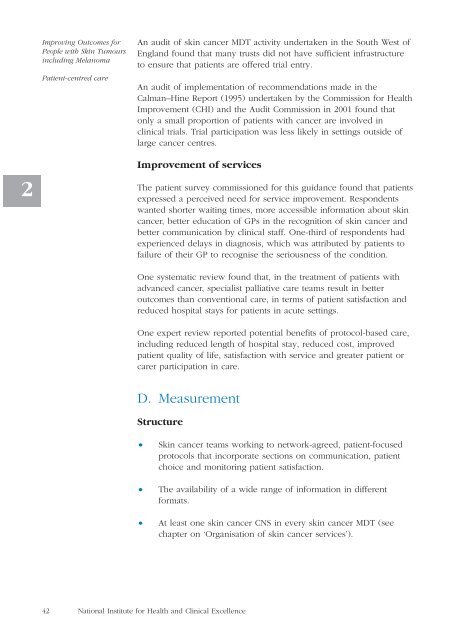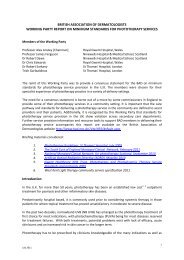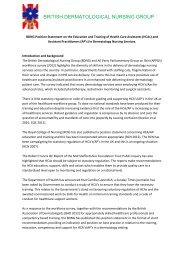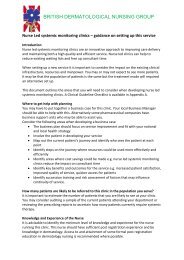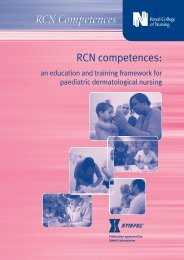Improving outcomes for people with skin tumours including melanoma
Improving outcomes for people with skin tumours including melanoma
Improving outcomes for people with skin tumours including melanoma
Create successful ePaper yourself
Turn your PDF publications into a flip-book with our unique Google optimized e-Paper software.
<strong>Improving</strong> Outcomes <strong>for</strong><br />
People <strong>with</strong> Skin Tumours<br />
<strong>including</strong> Melanoma<br />
Patient-centred care<br />
An audit of <strong>skin</strong> cancer MDT activity undertaken in the South West of<br />
England found that many trusts did not have sufficient infrastructure<br />
to ensure that patients are offered trial entry.<br />
An audit of implementation of recommendations made in the<br />
Calman–Hine Report (1995) undertaken by the Commission <strong>for</strong> Health<br />
Improvement (CHI) and the Audit Commission in 2001 found that<br />
only a small proportion of patients <strong>with</strong> cancer are involved in<br />
clinical trials. Trial participation was less likely in settings outside of<br />
large cancer centres.<br />
2<br />
Improvement of services<br />
The patient survey commissioned <strong>for</strong> this guidance found that patients<br />
expressed a perceived need <strong>for</strong> service improvement. Respondents<br />
wanted shorter waiting times, more accessible in<strong>for</strong>mation about <strong>skin</strong><br />
cancer, better education of GPs in the recognition of <strong>skin</strong> cancer and<br />
better communication by clinical staff. One-third of respondents had<br />
experienced delays in diagnosis, which was attributed by patients to<br />
failure of their GP to recognise the seriousness of the condition.<br />
One systematic review found that, in the treatment of patients <strong>with</strong><br />
advanced cancer, specialist palliative care teams result in better<br />
<strong>outcomes</strong> than conventional care, in terms of patient satisfaction and<br />
reduced hospital stays <strong>for</strong> patients in acute settings.<br />
One expert review reported potential benefits of protocol-based care,<br />
<strong>including</strong> reduced length of hospital stay, reduced cost, improved<br />
patient quality of life, satisfaction <strong>with</strong> service and greater patient or<br />
carer participation in care.<br />
D. Measurement<br />
Structure<br />
• Skin cancer teams working to network-agreed, patient-focused<br />
protocols that incorporate sections on communication, patient<br />
choice and monitoring patient satisfaction.<br />
• The availability of a wide range of in<strong>for</strong>mation in different<br />
<strong>for</strong>mats.<br />
• At least one <strong>skin</strong> cancer CNS in every <strong>skin</strong> cancer MDT (see<br />
chapter on ‘Organisation of <strong>skin</strong> cancer services’).<br />
42<br />
National Institute <strong>for</strong> Health and Clinical Excellence


